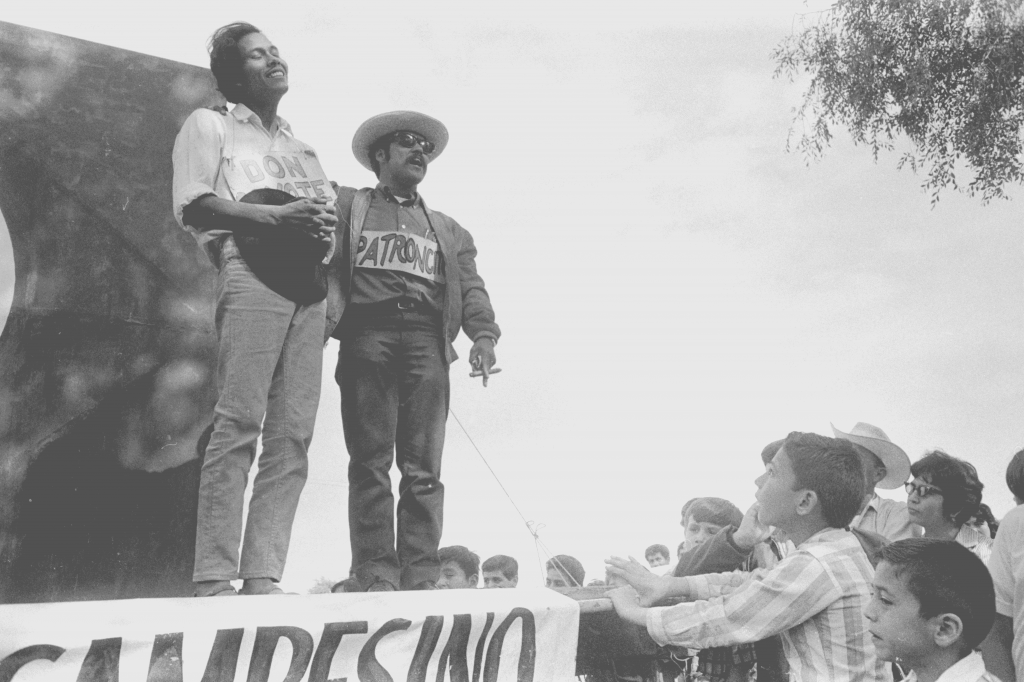CSUN to Explore Evolution of Chicano Theater with Playwright Luis Valdez

Two performers pictured on the back of a truck with an audience of children looking up at them. Image provided by John Kouns and the library’s Tom and Ethel Bradley Center.
Influential Chicano playwright and filmmaker Luis Valdez will discuss his theater company, El Teatro Campesino and its influence on the evolution of Chicano theater, during a special presentation on Wednesday, March 15, at California State University, Northridge.
His presentation, including a discussion of his book “Theatre of the Sphere: The Vibrant Being,” will take place at 7:30 p.m. in CSUN’s Campus Theatre, on the southwest corner of the campus located at 18111 Nordhoff St., Northridge.
Joining Valdez will be Jorge Huerta, professor emeritus of theater at the University of California, San Diego. The pair will discuss insights Valdez’s work provides into the unique aesthetic process of his internationally renowned theater company.
El Teatro Campesino was founded by Valdez in 1965, during the height of the United Farm Workers (UFW) struggle and the Great Delano Grape Strike in the California Central Valley. The theater company is located about 60 miles south of San Jose in the small city of San Juan Bautista. Teatro Campesino is recognized as the longest running Chicano Theater in the United States.
“Valdez’ biography is interesting, and applies to so many of our students at CSUN,” said Doug Kaback, a lecturer in CSUN’s Department of Theatre. “His identity as a child of migrant laborers in central California is reflected in his early work – as it utilized art to teach the importance of labor strikes – they were short but didactic. He then begins to explore longer works and elements of traditional theatre, but he is still working with the same themes and he’s still working from a cultural aesthetic.”
“I hope Valdez inspires all of us, particularly our students, to recognize the power of the arts. I hope he inspires those who listen to engage with and give back to the community,” said Kaback, who teaches in the Mike Curb College of Arts, Media, and Communication.
Valdez said his mission, along with that of the theater group, is to give a voice to unheard struggles and educate others through art. Many of his plays include the influences of his origins as a worker involved in the Chicano movement and the UFW. The scope of Valdez’s work is vast.
He began with “actos” — a term coined by Valdez to describe a skit with more complexity due to its social justice related connotations — titled “Las Dos Caras Patroncito” and “Quinta Temporada,” written to encourage campesinos to leave the fields and join the UFW.
His works also include “Bernabe” and “La Carpa de los Rasquachis,” plays that give the Chicanos their now contemporary mythology; “I Don’t Have To Show You No Stinkin’ Badges,” an exploration of urban Chicano life; and “Corridos,” reenvisioned classic Mexican folktales. Among his most notable works is “Zoot Suit,” the first Chicano play on Broadway which later inspired the first Chicano major feature film, a re-examination of the ‘Sleepy Lagoon Trial of 1942’ and the ‘Zoot Suit Riots of 1943.’
The discussion will feature dozens of images taken by photojournalists John Kouns and Emmon Clarke that are part of the University Library’s Tom & Ethel Bradley Center’s Farmworker Movement Collection. The images capture early performances by the theater group in union meetings, in the fields, at marches and on college campuses.
“The Farm Workers’ movement was truly a multiracial movement and these photos reflect the environment, you can see the performances of el Teatro Campesino and the various kinds of audiences engaged in what they’re doing,” said journalism professor Jose Luis Benavides, director of the Tom & Ethel Bradley Center.
To RSVP for the event, visit https://library.csun.edu/events/luis-valdez. Requests for accommodation services must be made at least five business days in advance of the event.

 experience
experience